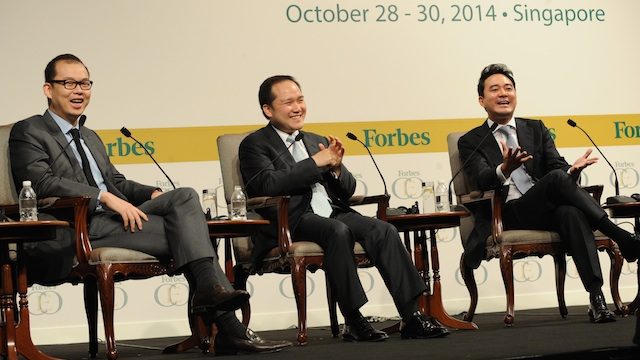SUMMARY
This is AI generated summarization, which may have errors. For context, always refer to the full article.

SINGAPORE – They joined their family business and have caught the attention of the global business community for the way they’ve taken the helm.
But asked whether CEOs should convince their children to take over the family business, all were in agreement – it’s a choice that children must make for themselves.
On Thursday, October 30, second and third-generation company leaders came together at the Forbes Global CEO Conference in this city-state to talk about their experiences, and the pressure of working in successful multi-million dollar businesses.
Sonia Cheng, the 33-year-old CEO of the Rosewood Hotel Group, was adamant in her position that forcing sons and daughters to get involved in the family business would only do harm.
“Don’t try to lure them away or force them to come back to the family business,” she told a room of business executives from all over the world. “They have to have the passion for your business; they have to love what they do in order to excel.”
While the sense of responsibility can be enough to bring them back, Cheng said it will not be enough to lead the company’s growth. At most, she said, forcing them back will “maintain” the business, but passion is essential and has to come from the children themselves.
Forcing their children to run the business, she said, may not only put the business at risk, but the relationship of parents and child as well.
“One challenging part is how do you manage a personal relationship while being professional. That’s a tricky aspect that you have to manage,” Cheng said.
Jonathan Tahir, 27, Deputy Chairman of Indonesia-based Mayapada group and the only son of group founder Dr Tahir, agreed.
Part of his success, he said, is driven by the desire not just to match his father, but to exceed him, highlighting the value of sheer passion as a key to growing the business.
“When I started my career early, my goal was just to be equal to my father,” he said. “But now as I’m going on in my career, you cannot just be the same as your father. You have to be better than your father because if you’re the same, that means you’re not growing.”
Early education
While all agreed on the value of passion and self-motivation, others suggested that this passion can be instilled, but it must be done early on.
Jeongdo Hong, CEO of JoongAng Media Network who inherited Korea’s largest media group, admitted he wants his own children to run the business, the same way he took over for his father.
What worked for him, Hong said, was being exposed to the business at a young age.
“One thing for sure is if any of you want your sons or daughters to join your office, you have to educate them while they’re young. A very important thing is early education,” he said.
Hong added, “My father always told me his goals [for me] and appreciated me. He said I could run the business but with one condition: you have to be competitive, you have to be good, you have to be a hard worker.”
“That’s what controlled me through my adolescence. Yes maybe I was brainwashed, I could’ve gone to the US and enjoyed my life there, [but it worked].”
Despite this, Hong emphasized the need to “give them some room.”
“We’re definitely under pressure, because we’re against higher expectations,” he said, sharing his own experience as a child of a business tycoon. “They already feel the responsibility anyway. If [they] are pushed [they] would make other choices.”
“The most important thing is give them some room. You may school them but please spare some room for them.”
Cheng also offered an alternative that may appease both parent and child.
“An alternative option is ask them what they like to do and explore the business they might be interested in,” she said. “It may be worth expanding and exploring.” – Rappler.com
Add a comment
How does this make you feel?
There are no comments yet. Add your comment to start the conversation.